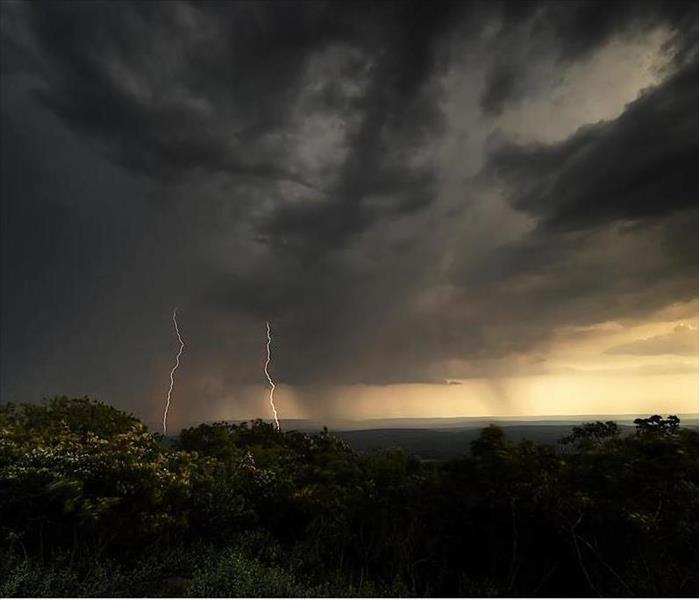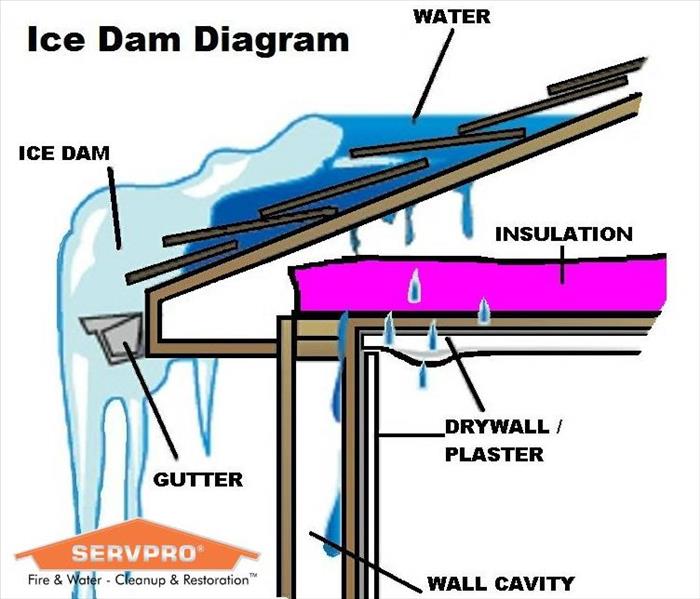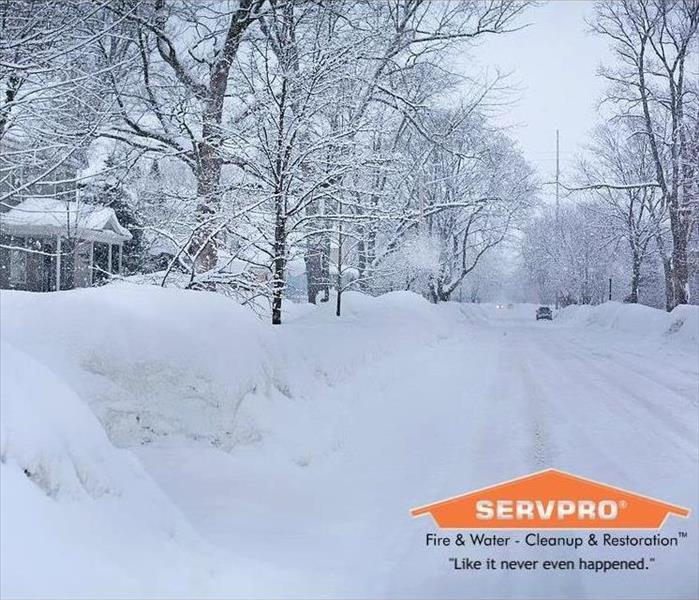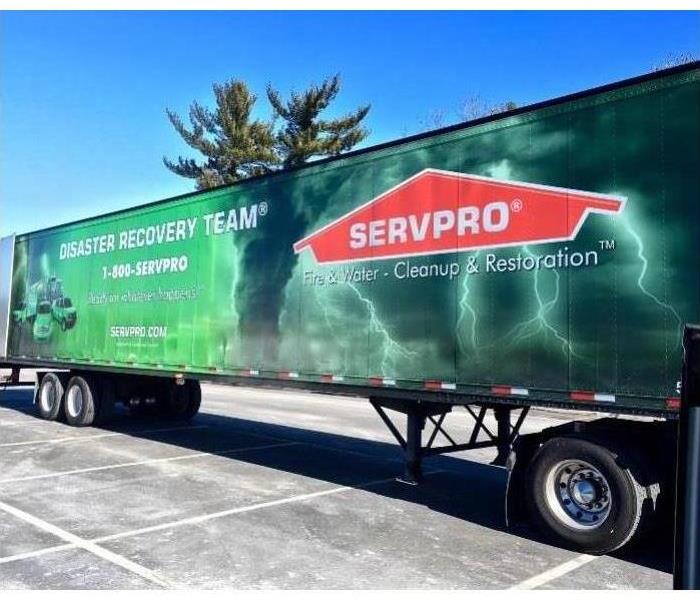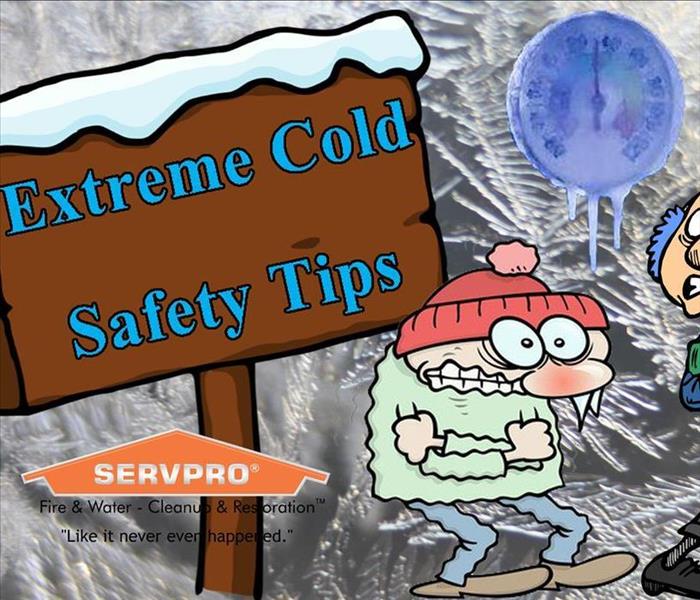Archived Storm Damage Blog Posts
When Icicles On Your Twin Lake Home Turn From Pretty To A Problem
1/23/2024 (Permalink)
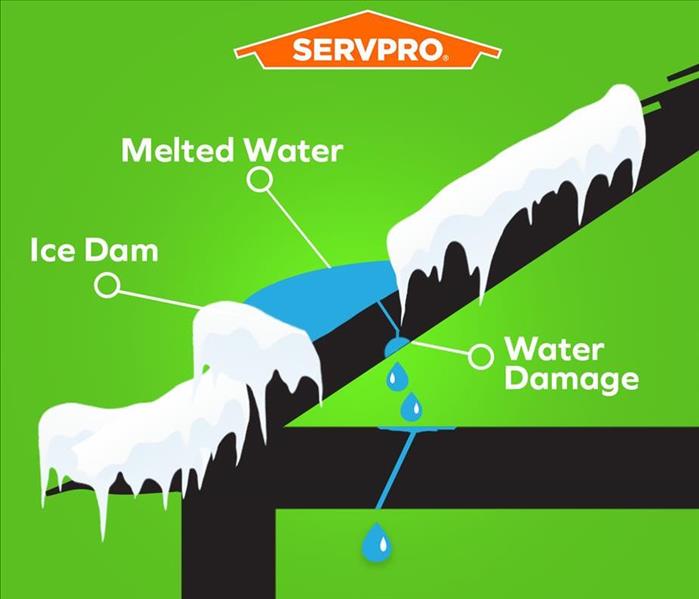 Water damage from an ice dam? We're Here to Help®
Water damage from an ice dam? We're Here to Help®
Icicles on your home may give it a quaint look during the winter months, but they can actually be indicating a potential water damage problem - ice dams. Ice dams occur when heavy snow buildup melts during the day and then refreezes overnight when temperatures drop. After several days of this melting-freezing cycle, it is common for the melted water and ice to work up under the shingles of your roof, entering your attic, and then eventually damaging ceilings, walls, and contents.
There's no guarantee that an ice dam won't damage your home, but you can take the following steps to help reduce the chances of an ice dam forming to begin with:
- Thoroughly clean all leaves, sticks, and debris from your gutters and downspouts to allow proper flow.
- Make every effort to keep snow on your roof to a minimum. Roof rakes are a safe way to pull snow off of your roof while standing on the ground.
- Throughout the winter months, keep gutters and downspouts clear of snow and icicles.
- Evaluate the insulation and ventilation in your attic. In Michigan, experts recommend a R-value of R-38. Good airflow under the eaves or soffit area along the underside of the roof and out through the roof vents is essential. Proper insulation prevents heat loss from the inside of the home and venting allows the attic air to stay cold enough to prevent or minimize the freeze/thaw cycle on your roof.
If an ice dam causes water damage to your home or business, call SERVPRO of Muskegon, 231-733-7601, we're Here to help®
Storm Damage in Lakewood Club, MI and Your Belongings
5/31/2022 (Permalink)
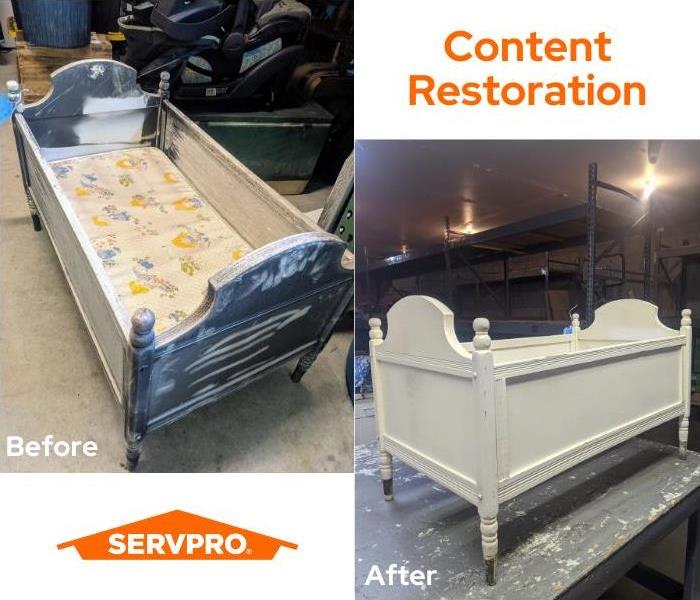 SERVPRO of Muskegon helps preserve items that can't be replaced, like this antique crib.
SERVPRO of Muskegon helps preserve items that can't be replaced, like this antique crib.
Storm and water damage affects not only the structure of your home but also your belongings. SERVPRO of Muskegon understands that your home is more than a structure; your family's furniture, clothing, keepsakes, and other belongings help transform a house into a home.
Our "restore" versus "replace mentality and our expertise can help you save money while preserving keepsakes that are not able to be replaced like this antique crib from a Lakewood Club home. Different methods of cleaning are used for cleaning contents depending on the item.
SERVPRO of Muskegon can also conduct an organized and efficient pack-out/move-out of the affected areas if your home requires extensive restoration or cleaning. When restoration is completed, we work with you to coordinate the move-in according to your needs.
Many homeowners are not aware that water-damaged electronics can most likely be saved, as well as photographs and documents. The key to restoring these types of items is taking prompt action to prevent further damage.
If your contents have been affected from storm damage, call SERVPRO of Muskegon, 231-733-7601. We're Here to help® 24/7
Prepare Yourself And Your Pets For A Storm In Twin Lake, MI
5/14/2022 (Permalink)
 Make sure everyone is prepared for a storm, fur kids included.
Make sure everyone is prepared for a storm, fur kids included.
Severe weather can turn a normal day into a catastrophe. There are several emergency plans that you can follow to keep your family safe, but have you thought about your pets? Have you planned for them? Below are some tips to keep your family safe, animal kids included:
- Create a Plan - if an emergency arises and you need to leave your home, do you have a plan on where you and your pets will stay? Make a list of hotels that are pet friendly and talk with friends and family to see if they would be willing to accommodate all of you. Unfortunately, Red Cross shelters only allow service animals.
- Make Sure Your Pets Can Be Identified - check that your pets collars and tags are up-to-date, and if they are microchipped that is even better.
- Have Pet Carriers Accessible - make sure to have carriers, harnesses, and leashes readily available.
- Practice Makes Perfect - consider practicing your emergency plan with your family and pets. Car rides can be stressful for some pets. By practicing ahead of time, your pets will hopefully become more comfortable with traveling.
- Hide and Seek - stressful situations cause some pets to hide. If yours is prone to hiding, be sure to know their hiding places in case you need to evacuate quickly.
- Emergency Kit - preparation is key. A few items to include in your pets emergency kit are, food and drinking water, bowls, litter box, medications, medical records, toys, waste bags, additional leashes/harnesses.
Has a storm affected your Twin Lake home? Call SERVPRO of Muskegon today, 231-733-7601. We are Here to Help®
When Storms or Floods Hit Muskegon, SERVPRO is Ready!
5/10/2022 (Permalink)
 Our highly trained crews are ready to respond 24/7 to storm or flood damage in Muskegon County.
Our highly trained crews are ready to respond 24/7 to storm or flood damage in Muskegon County.
SERVPRO of Muskegon specializes in storm and flood damage restoration. Our crews are highly trained and use specialized equipment to restore your property, as closely as we can, to its pre-storm condition.
Faster Response
Since we are locally owned and operated, we are able to respond quicker with the right resources, which is extremely important. A fast response lessens the damage, limits further damage, and reduces the restoration cost.
Resources to Handle Floods and Storms
When storms hit Muskegon, we can scale our resources to handle a large storm or flooding disaster. We can access equipment and personnel from a network of 2,000 Franchises across North America and elite Disaster Recovery Teams that are strategically located throughout the Country.
Experienced Storm or Flood Damage? Call SERVPRO of Muskegon Today, 231.733-7601
Tornado Season Is Looming; Are You Ready Fruitport?
5/3/2022 (Permalink)
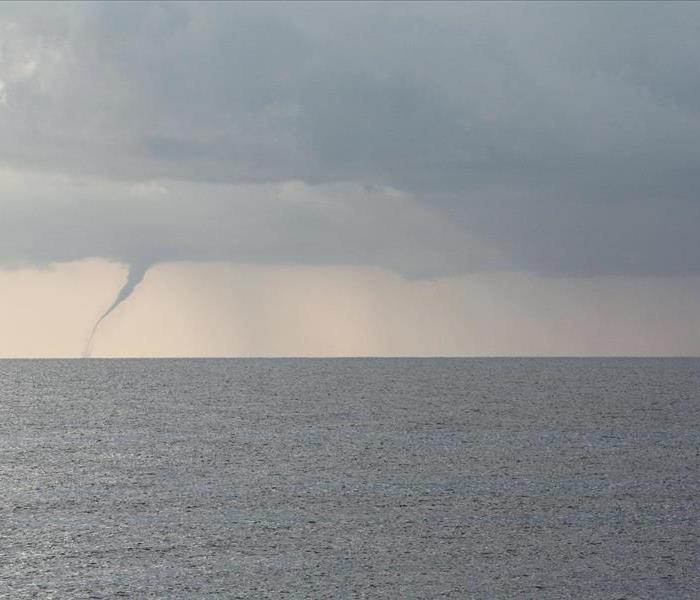 Tornadoes are dangerous but these tips can help you and your family stay safe.
Tornadoes are dangerous but these tips can help you and your family stay safe.
Tornado season is here. Most tornadoes occur in April, May, June, and July between 3pm - 7pm in Fruitport, MI. The average tornado is grounded for less than 10 minutes and travels about five miles. A typical tornado as it touches the ground averages 200 to 400 yards, averaging winds of 71-125 mph in Michigan. The following are some tips to make sure you and your family stay safe during a tornado:
Know the difference between a tornado watch and a tornado warning.
Tornado Watch - is issued to alert people to the possibility of tornado development in your area.
Tornado Warning - is issued when a tornado has actually been sighted or is indicated by radar.
Environmental clues to look out for:
- Dark, often greenish skies
- Wall cloud
- Large hail
- Loud roar; similar to a freight train
Where you should take shelter during a tornado.
In a home - the basement offers the greatest safety. Seek shelter under sturdy furniture if possible. In homes without a basement, take cover in the center part of the house, on the lowest floor, in a small room (closet or bathroom) without windows.
In a mobile home - the home should be evacuated, and shelter should be taken in a prearranged substantial shelter. If nearby shelter is not available, leave the home and lie flat in a ditch or ravine. Protect your head by placing your arms over it. Do not take shelter under your home.
Driving a vehicle - get out of the vehicle and take shelter in a nearby ditch or ravine, do not get under the vehicle. Lie flat and put your arms over your head.
At work or school - follow prepared plans to move to interior hallways or small rooms on the lowest floor. Avoid areas with windows or glass.
In open country - lie in a gully, ditch, or low spot on the ground and hold onto something on the ground, if possible. Do not seek shelter in damaged buildings as they may collapse.
Have an emergency plan and kit in place.
Each tornado season, review with your family your emergency plan and practice it. Make sure to put together an emergency kit that includes a flashlight, extra batteries, battery-operated radio, first aid kit, can opener, canned food, bottled water, and extra clothes.
If your home suffers from storm damage, call SERVPRO of Muskegon, we are Here to help®, 231-733-7601
Winter Storms Can Cause Lots of Damage to Your North Muskegon Home
12/14/2021 (Permalink)
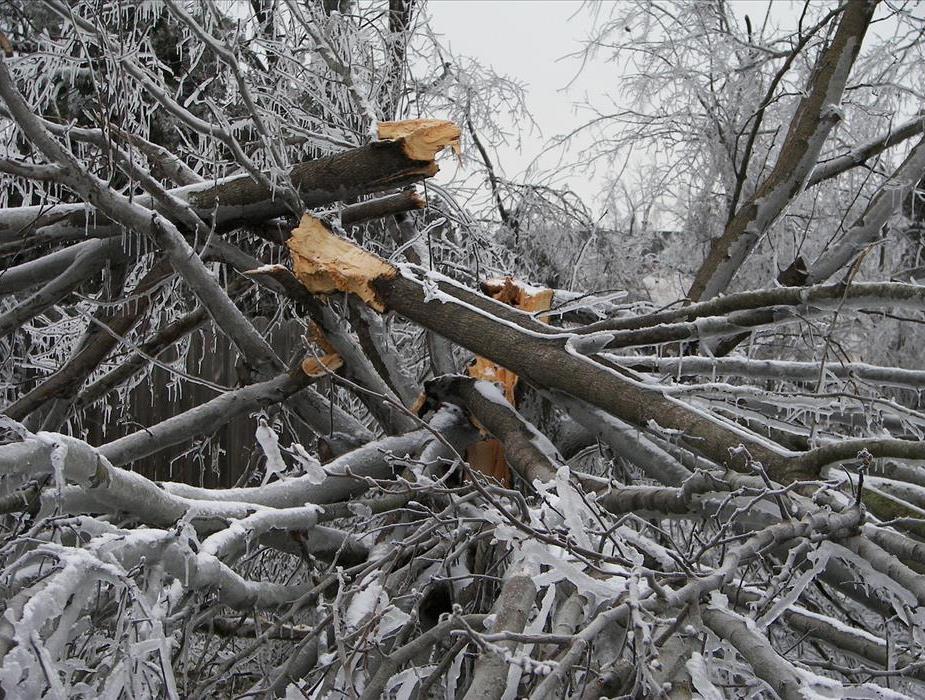 Winter storms can be disastrous to your home or business.
Winter storms can be disastrous to your home or business.
Michiganders and North Muskegon residents should be prepared to pull out the puffy coats and bundle up this winter! The Farmers Almanac is expecting temperatures and conditions to be freezing this year in Michigan. There are many different possible types of storm damage in the winter months. The following are a few to be aware of:
- Strong winds may loosen roof shingles.
- Strong winds may pick up rocks or other small items and throw them against your siding and windows.
- Snow or ice can potentially make its way inside holes or cracks in your foundation, roof, or siding.
- Tree branches could fall onto your roof or scrape your siding.
- Ice dams can block water from going down gutters and force water under your shingles.
- Heavy snows can cause your roof to collapse.
There are actions that you can take ahead of time to prepare yourself and your home or business prior to a storm. Check out our blog, Protect Your Cloverville Home from Winter Woes for information on what you can do to prevent winter storm damage to your home or business.
Was your home or business affected by winter storm damage? Call SERVPRO of Muskegon to assess the damage, 231-733-7601, we are Here to help®
Protect Your Cloverville Home from Winter Woes
12/9/2021 (Permalink)
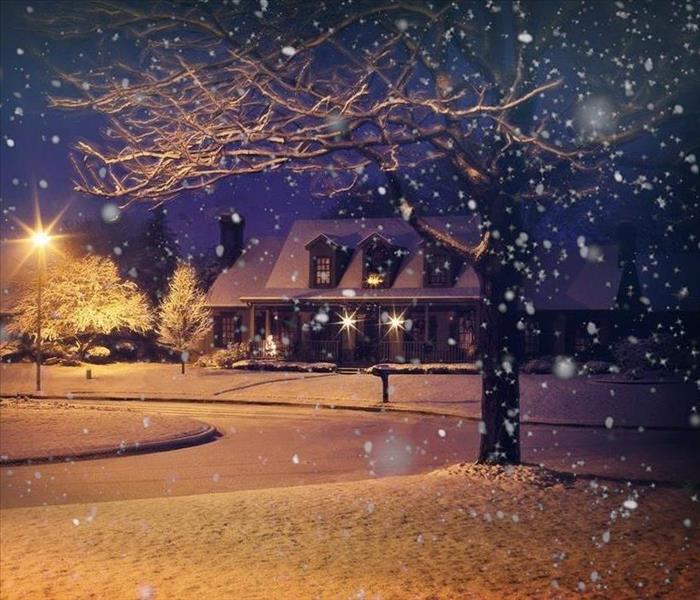 Protect your home or business from winter storm damage.
Protect your home or business from winter storm damage.
Winter in West Michigan means cold, snowy, and potential damage to your home or business from winter storms. Now is the time to take action with these easy ways to prevent property damage.
- Protect your pipes - frozen pipes are the number one water damage in the winter months. Wrapping basement and crawl space pipes with insulation is an easy solution to help prevent this disaster.
- Clean gutters and storm drains - make sure gutters and drains are free of debris to help avoid cracking gutters, ice dam buildup, or melting snow leaking into your basement.
- Trim tree branches - trim overhanging branches away from your roof or hire a tree service to remove any threatening branches.
Has winter storm damage taken a toll on your Cloverville home or business? Call SERVPRO of Muskegon to assess the damage and make it "Like it never even happened," 231-733-7601
Basement Flooded? Immediate Actions to Take
8/13/2021 (Permalink)
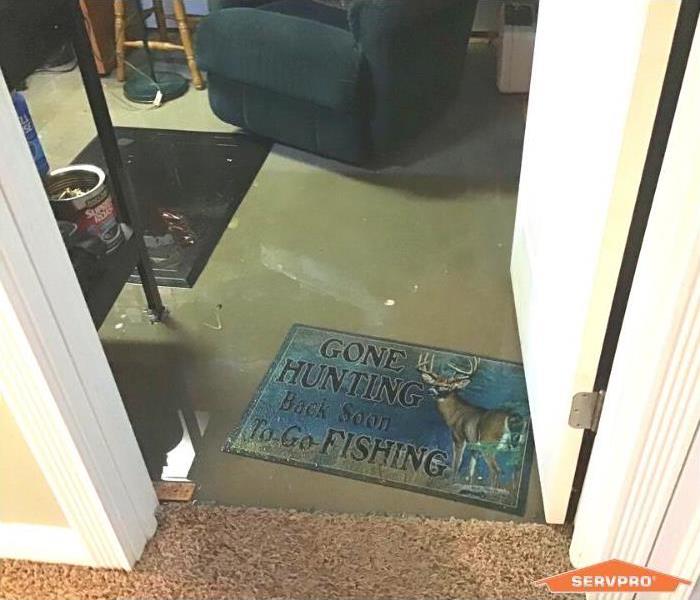 This flooded basement in Whitehall was caused by a recent rain storm.
This flooded basement in Whitehall was caused by a recent rain storm.
With all of the heavy rains recently we have been receiving many calls about flooded basements. Many homes have fully finished basements, like this home in Whitehall. The following are some tips if you encounter a flood in your basement.
- If you have electronic devices or appliances in the basement, do not enter until you have shut the power off to your home.
- Once electronic devices are removed or unplugged, start extracting as much water as you can. If your sump pump failed, you may need to buy a new one to drain the water. Removing the water as quickly as possible is key.
- Next you will need to remove all damp/wet objects, such as furniture, to an area where they can dry out. Carpet and carpet pad should be removed if the water was from outside or sewage.
- After all damp items have been removed from the area the drying process should start immediately. Air movers and dehumidifiers will help dry your basement the fastest and minimize chances of mold growth.
Too overwhelmed by these tips? SERVPRO of Muskegon has IICRC trained professionals and industrial equipment to make sure that the job is done right. We are Here to Help.
Is your basement flooded? SERVPRO of Muskegon can help, 231-733-7601
Tornado Preparedness in Norton Shores
6/1/2021 (Permalink)
 Tornado preparedness is key this season.
Tornado preparedness is key this season.
In Norton Shores, tornadoes mostly occur in the months of April, May, June, and July. The average tornado is grounded for less than 10 minutes and travels about 5 miles. A typical tornado as it touches the ground averages 200 to 400 yards, averaging winds of 71-125 mph in Michigan. Use the following tips to learn how to prepare for a tornado and to keep you, your loved ones, and property protected this season.
Tornado Warning Signs
Tornadoes can form without much warning. Make sure to stay alert and pay attention when a tornado watch or warning is issued in your area. If you see any of the following signs, take shelter immediately:
- A funnel cloud
- Roaring noises
- Dark skies, potentially tinted green
- Debris
- Hail
Tornado Safety Preparation Tips
Properly preparing your home for disaster is one of the easiest ways to keep your family safe in case of a tornado. The following are some key tips:
- Designate a safe room - this area can be a storm cellar, a basement, or a room on the lowest level of your home without any windows, such as a closet.
- Put essentials in your safe room - have an emergency kit full of food, water, important documents, and life-saving supplies readily available in your safe room.
- Remove outdoor items - debris, dead trees, and furniture are likely to get picked up by the wind and thrown into your home. Secure or remove as many outdoor items on your property as possible.
- Contact your insurance agent - it is important to understand what kind of damage is and is not covered under your homeowner's insurance.
Have damage after a storm? Call SERVPRO of Muskegon, we are Here to Help, 231-733-7601
Storm Season in Twin Lake; Are You Prepared?
5/17/2021 (Permalink)
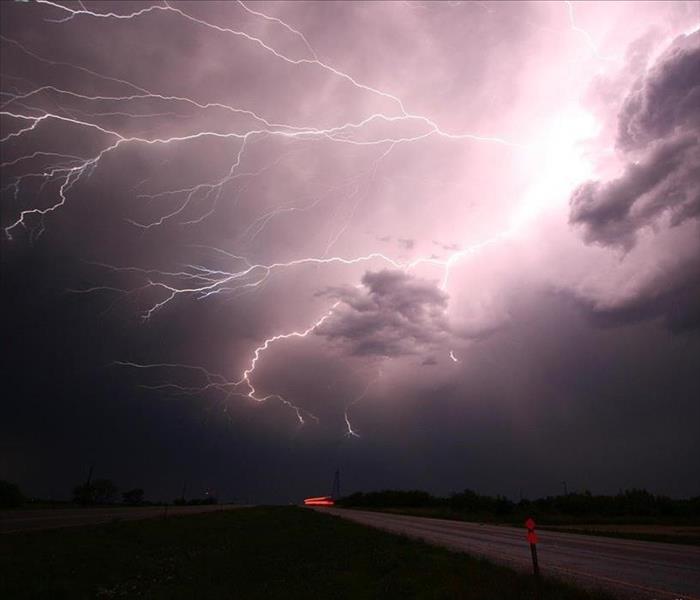 Thunderstorm Watch, Thunderstorm Warning. Do you know the difference?
Thunderstorm Watch, Thunderstorm Warning. Do you know the difference?
In Twin Lake, storm season is here. It typically starts in late March, peaks in July, and runs through August into early September. This is due to the warmer weather bringing moisture and humidity to the air, which brings instability to the atmosphere, resulting in the potential for severe weather. Summers in West Michigan mean fun and sun but also can bring thunderstorms, strong winds, and the occasional power outage. The following are some tips from The National Weather Service to make sure you and your family stay safe this spring and summer:
Know the difference between a severe thunderstorm watch and a severe thunderstorm warning.
Severe Thunderstorm Watch - a storm is possible and near the watch area. Monitor the situation and be prepared to act if a warning is issued.
Severe Thunderstorm Warning - severe weather has been reported by spotters or indicated by radar; an imminent danger to your safety and property is present. Take cover in a solid building or vehicle with the windows closed.
Have an emergency plan and kit in place.
Severe weather is at its worst when it catches us by surprise; that is why having an emergency plan in place is crucial. Make sure to consider all weather events that are most likely to happen in your area. Items to have in your emergency kit include: battery-operated flashlight with extra batteries, weather radio, first-aid kit, a three to five-day supply of bottled water and non-perishable food, blankets, sleeping bags, and cash.
The National Weather Service is predicting more than average rain this spring for Michigan, with temperatures expecting to be higher than average. Now is the time to make your emergency plan and gather your items for your emergency kit.
If your home or business experiences damage from a storm, call SERVPRO of Muskegon to make it "Like it never even happened." 231-733-7601
How to Protect Yourself in Montague, MI During a Power Outage
5/10/2021 (Permalink)
 Be ready for a power outage with these tips.
Be ready for a power outage with these tips.
Power outages can be stressful not knowing when power will be restored to your Montague home. Check out these power outage tips from Ready.gov to be ready for the next outage.
- Have enough nonperishable food and water on hand.
- Keep freezers and refrigerators closed. Throw out food if temperatures reach 40 degrees or higher inside the refrigerator or freezer.
- Use a generator, but ONLY outdoors and away from windows.
- Do not use a gas stove or oven to heat your home.
- Disconnect appliances and electronics to avoid damage from electrical surges.
- Have alternate plans for refrigerating medicines or using power-dependent medical devices.
- Have enough flashlights for every household member with backup batteries.
- Check with local officials about heating and cooling locations open near you.
Experienced damage to your home after a storm? Call SERVPRO of Muskegon, we are Here to Help, 231-733-7601
Emergency Storm Damage Assistance in Ravenna, MI
5/3/2021 (Permalink)
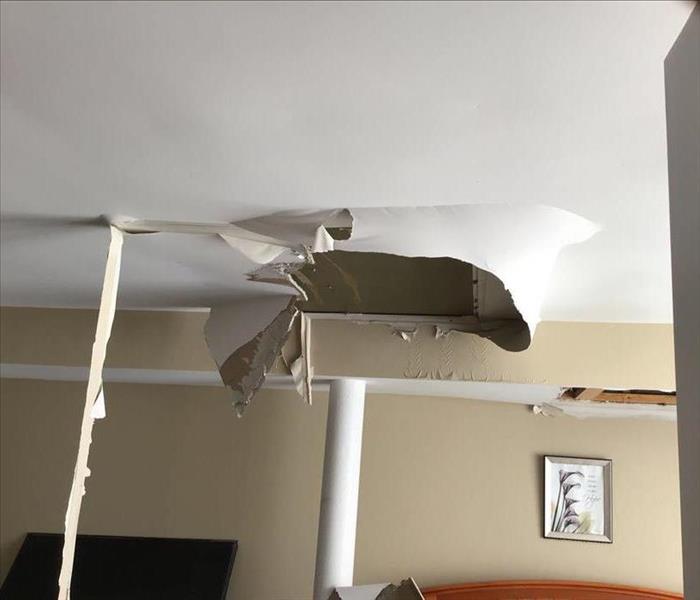 We are Here to Help after the storm.
We are Here to Help after the storm.
Storm damage does not always strike during regular business hours, so that is why SERVPRO of Muskegon is available 24 hours a day, 365 days a year with our on-call emergency service. We are Here to Help Ravenna homeowners secure their property and start mitigation after an emergency event promptly.
SERVPRO of Muskegon can provide temporary protective measures to prevent additional damage to your property after a disaster. If after a fire or flood your contents need to be removed from your affected property during the restoration process, SERVPRO of Muskegon can pack your contents and move them to our warehouse for storage until the restoration process is complete. Once restoration is complete, your contents are returned to your property.
Has your home experienced damage from a recent storm? Call SERVPRO of Muskegon to help, 231-733-7601
Common Types of Storm Damage in Lakewood Club, MI
4/21/2021 (Permalink)
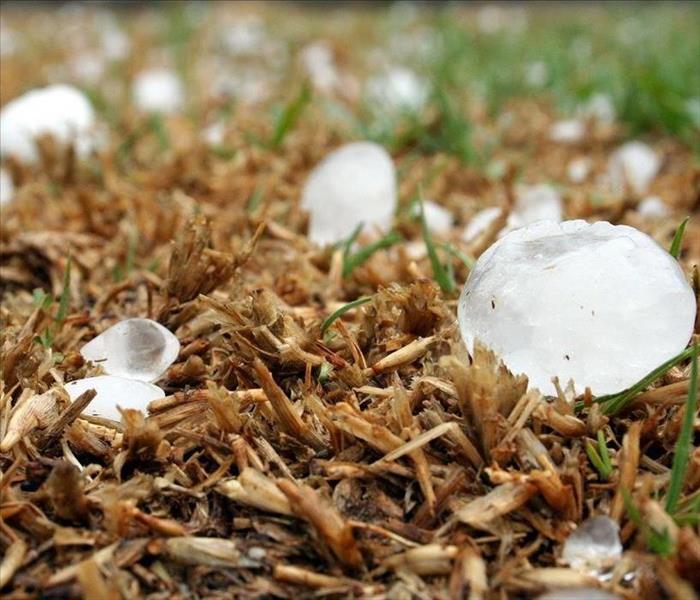 Hail is one type of damage a storm can cause to your business or home.
Hail is one type of damage a storm can cause to your business or home.
Weather can be unpredictable and severe storms can come out of nowhere. When storms blow through Lakewood Club, they bring all sorts of conditions with them. The following are a few basic types of damage a storm can cause to your home or business:
Wind
Strong gusts of wind can harm your house or business in different ways. It can lift shingles from your roof, leaving it exposed to the elements and further damage. Winds can also carry debris and when that debris comes in contact with your business or home at a high speed, it can cause cracks and holes in siding and windows.
Water
Heavy rainfall can cause street flooding as well as flooding inside your home or business. Water wants to find the lowest point so it can find its way into your home from the ground level or a crack in your roof. Make sure to call SERVPRO of Muskegon if your home or business suffers from water damage to make sure it is mitigated properly.
Hail
Hail damage is difficult to identify the cause because the next day it melts away. Depending on the size of hail, it can cause cracks and holes in siding, knock loose roofing materials, or shatter and chip windows.
If your home or business has suffered storm damage, call SERVPRO of Muskegon to make it "Like it never even happened." 231-733-7601
Winter Weather Preparation
12/16/2020 (Permalink)
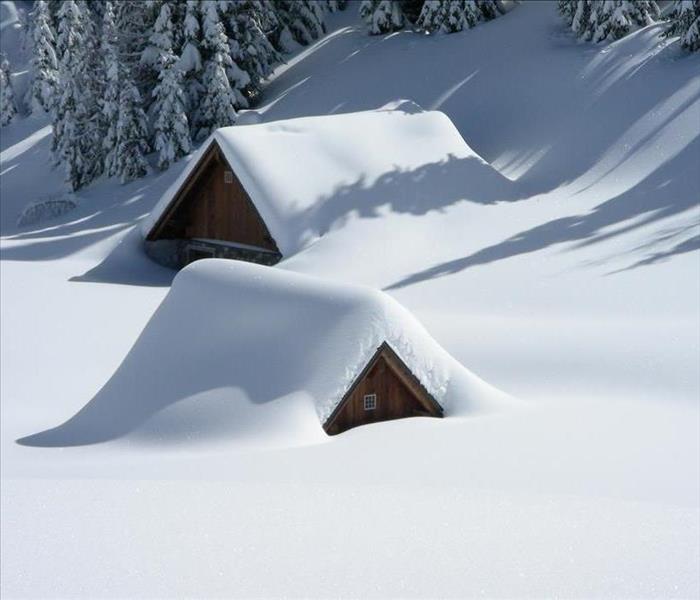 Keep yourself and your home safe this winter.
Keep yourself and your home safe this winter.
Blustery winter weather is fast approaching. SERVPRO of Muskegon knows about severe weather and have helped many families and businesses in the area mitigate storm damage over the years.
Being prepared for inclement weather and knowing the difference between Advisories, Watches, and Warnings can help you stay safe this winter. The following are the definitions of various winter warnings from the Federal Emergency Management Agency (FEMA):
Advisory: issued when snow, blowing snow, ice, sleet, or a combination of these wintry elements is expected but conditions should not be hazardous enough to meet Warning criteria. Be prepared for winter driving conditions and possible travel difficulties. Use caution when driving.
Watch: issued when conditions are favorable for a significant winter storm event. Heavy sleet, heavy snow, ice storms, blowing snow, or a combination of these events are possible.
Warning: issued for a significant winter weather event including snow, ice, sleet, blowing snow, or a combination of these hazards. Travel will become difficult or impossible in some situations. Delay your travel plans until conditions improve.
SERVPRO of Muskegon has a team of highly trained technicians on call 24 hours a day, 7 days a week, call (231) 733-7601, and we'll restore your storm damage, "Like it never even happened."
Preparation is Key
8/25/2020 (Permalink)
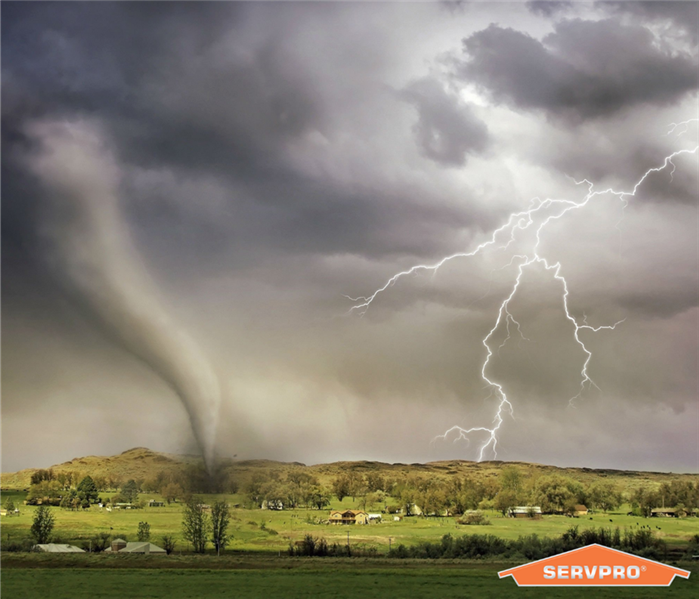 Are you prepared for severe weather?
Are you prepared for severe weather?
Severe weather can be a scary thing. Preparation is key to staying safe and minimizing impacts. The following are a few tips from the National Weather Service to make sure you are prepared when the next severe weather hits:
- Be Weather-Ready: Check the forecast regularly to see if you're at risk for severe weather. Listen to local news to stay informed about severe thunderstorm watches and warnings.
- Sign Up for Notifications: Know how your community sends warning. Some communities have outdoor sirens. Others depend on media and smart phones to alert residents to severe storms.
- Create a Communications Plan: Have a family plan that includes an emergency meeting place and other pertinent information. Pick a safe room in your home such as a basement, storm cellar or an interior room on the lowest floor with no windows.
- Practice Your Plan: Conduct a family severe thunderstorm drill regularly so everyone knows what to do if a damaging wind or large hail is approaching. Make sure all members of your family know to go to the meeting place when severe thunderstorm warnings are issued and don't forget pets if time allows.
- Prepare Your Home: Keep trees and branches trimmed near your house. If you have time before severe weather hits, secure loose objects, close windows and doors, and move any valuable items inside or under a sturdy structure.
- Help Your Neighbor: Encourage your loved ones to prepare for severe thunderstorms. Take CPR training so you can help if someone is hurt during severe weather.
If your home or business has experienced damage from a severe storm, call SERVPRO of Muskegon today, (231) 733-7601.
Hailstorm Tips
6/3/2020 (Permalink)
We can experience a wide variety of severe weather in Michigan. It may not be super common, but thunderstorms often accompany hailstorms. Hailstorms are known to knock out power, so it is always best to have a plan in place. This includes having a survival kit with flashlights, a radio, water, etc. It is always best to be aware when severe weather is coming as well. Pay attention to future forecasts and always prepare for the worst. When a hailstorm is approaching, go indoors and remain inside until the storm has passed. If you have a garage, it is best to move vehicles inside as well. Also, keep pets indoors as hail can widely vary in size. When the storm has passed, be sure to check your roof for any damage. You do not want surprise water damage when the next storm rolls through!
Severe Weather Preparation
5/26/2020 (Permalink)
Here in West Michigan, we can experience some pretty severe storms in late spring, early summer. Although we may not experience the magnitude of severe weather like other parts of the country, we have our fair share of bad storms. That is why it is important to always be prepared for severe weather. For starters, always be weather ready. Check the forecast on a daily basis so that you know if severe weather is on its way. If available, sign up for local notifications. Many cities and towns have warning systems that will alert you when severe weather is immanent. Always be sure to have a plan in place and a designated room for your family to take shelter in. It is easy to panic in chaotic situations so be sure to prepare with severe weather drills so that every family member knows what to do.
Pre-Flood Safety
5/26/2020 (Permalink)
If you have been watching the news recently, you are likely aware of all the flooding that Michigan has experienced. Many residents are experiencing flooding for the first time. It is always important to be prepared for flash floods. In the event of a disaster, always have at least one emergency contact. This person should be the individual you regularly check in with, knows your location, and is aware of a safe location to meet up. It is also important to have plenty of supplies. The recommended amount is at least 3 days of food and water. If you are stranded due to a flood, you always want to have what you need to survive. If you are able to evacuate before a flood strikes, have a route in mind. Always know the quickest and safest way to get to high ground. If time allows, prepare your home before evacuation such as placing sandbags around the perimeter. It never hurts to limit the damage. If you live in a flood prone area, be sure to purchase flood insurance as it is typically not included in a standard homeowner's policy. Once everything is packed and prepared, always evacuate if possible.
Muskegon County State Of Emergency
5/21/2020 (Permalink)
It is not uncommon to experience water damage due to spring storms. Each year we have an uptick in water damage calls since the water table is still high due to the winter thaw. This year has definitely been different though. Many individuals who live in flood prone areas can agree that even starting last fall, the water table was really high and they would experience flooding with even minor rain storms. This spring has brought some severe storms that have left many homeowners dealing with more flooding than they have ever experienced. The flooding is so severe that local authorities have declared a state of emergency. Community members who have been affected by flooding can contact the county’s Department of Emergency Management by sending their name, address and cell phone number, along with any pictures of damage to their property, to em@co.muskegon.mi.us.
Spring Storm Tips
4/23/2020 (Permalink)
Each Spring in Michigan, there tends to be at least a couple severe thunderstorms. Now that winter is over, it is important to make sure that you are prepared for these events when they do occur. Do not wait until the last minute to make sure that you have the necessary supplies. Here are some tips to help prepare you for severe thunderstorms:
- Always keep a battery powered radio in the home and check the batteries regularly
- Keep multiple flashlights easily accessible
- Keep a supply of candles on hand
- As a safety precaution before leaving the house on vacation, unplug all electrical appliances except for lights connected to automatic timers
- If you live in a storm-prone area, nail down roof shingles or use adequate adhesive to keep them from blowing off in a violent wind. For roofs with shingles that are not the seal-down type, apply a little dab of roofing cement under each tab
- Keep extra food and water on hand
- Have a good shelter location for very severe storms
Make sure that you are prepared for whatever mother nature sends your way!
Winter Storms Have Arrived
12/20/2019 (Permalink)
Winter storms can bring a variety of concerns to home and business owners alike. Many individuals who have experienced storm damage in the past can attest to it often being very costly. That is why it is important to take proper precautions to prepare for the winter season. Winter in West Michigan typically brings a variety of snow and ice storms. Large quantities of ice on the eaves of structures creates ice dams and often results in water damage to your home or business. Ice storms have the ability to create large scale power outages and cause pipes to freeze. Take the time to make sure that you have plans in place should a winter storm put you in a tough spot. If your home or business experiences a loss, we are here to help.
SERVPRO of Muskegon: 231-733-7601
High Winds
8/5/2019 (Permalink)
With summer storms often come straight line winds. Straight line winds, similar to a tornado, have the ability to cause serious structural damage. Fallen trees and large branches can easily puncture a roof. We have dealt with many cases in which a home has suffered roof damage during a storm resulting in large amounts of water pouring into the home. If your roof suffers damage during a storm, get it repaired as soon as possible. The longer the roof remains damaged, the more likely you will need water restoration. Once the roof has been repaired, ensure that no water has found its way into your home. Moisture has the ability to seep into drywall and other areas that are undetectable without professionally equipment. If you feel that your home or business has experienced water damage, call today!
Have Water or Flood Damage?
Call Us Today – (231) 733-7601
Storm Safety
6/28/2019 (Permalink)
When it comes to thunderstorms, especially those with a large amount of lightning, things can easily become dangerous. That is why the CDC offers some great tips on how to exercise proper safety during storms. If it begins to storm, try to postpone your trip or activity and head indoors to an enclosed shelter. They also highlight the 30-30 rule which means that after you see lightning, start counting to 30. If you hear thunder before you reach 30, go indoors. Suspend activities for at least 30 minutes after the last clap of thunder. Even being indoors still has some safety risks during violent thunderstorms. One of the main things to remember is to stay away from concrete floors and walls. Lightning has the ability to travel through any metal wires or bars in concrete floors or walls that can result in serious injury. Exercise storm safety at all times!
Summer Storm Damage
6/3/2019 (Permalink)
It is not uncommon for us to experience a large amount of violent thunderstorms throughout the summer months. There are a variety of different unfortunate events that can result in serious damage to your home when these storms occur. Strong winds can bring down trees and large branches that can easily produce roof damage. Power outages can result in flooded basements for homes whose sump pump doesn't have a battery backup. Heavy rains can result in downspout backups that have the ability to pool up and get under shingles. Cracks in your foundation can result in flooding if the water table rises too high. With all of these risks and more, make sure that you are prepared. If you experience storm damage, we are here to help!
Are You Storm Ready?
6/3/2019 (Permalink)
With the violent summer storms that we can experience at any time, it is important to make sure that you are storm ready. Many people do not take into consideration the situation that a violent storm can put them in. A loss of power can result in lack of fresh water, air condition, heat, and more. When these situations occur, it is important to make sure that you are prepared. Always have flashlights, fresh water, non-perishable food, a radio, a portable phone charger, and more. Take the time to create a checklist and storm plan with your family so that you are never caught off guard. Ensure that your children know where to go in case of a tornado emergency. You can never be over prepared, but you can be under prepared.
Have Your Radio Ready
6/3/2019 (Permalink)
There is not many common situations more unsettling than experiencing a violent thunderstorm and not knowing what is going on. When thunderstorms occur, power outages tend to shortly follow. Many of us do not realize the inconvenience that a power outage creates. Unless you are running a generator, in a blink of an eye you lost heat/air condition, water if you have a well, television, internet, and more. This can leave you feeling scared and helpless with no idea what is going on or when the storm will be over. Even though today's technology is able to keep us well informed in most situations, it is always important to have a portable radio nearby to keep you updated. Having access to local weather radio can be a lifesaver if all else fails.
Winter Storms Causing Ice Dams
1/3/2019 (Permalink)
Although a mild winter is nice, it also brings about an increased chance of water damage from ice dams. An ice dam is when a ridge of ice forms at the edge of a roof. It prevents melting snow and rain from draining off the roof. Snow and rain storms flip-flopping regularly is a recipe for disaster when it comes to ice dams. As the water gets backed up behind the ice, it can easily find its way under your shingles and effect your ceiling and wall cavities. This can bring about many more issues such as droopy ceilings and moldy wall cavities.
There are a couple different ways to prevent ice dams and ice dam damage. The first is that many homeowners will have heating cables installed to prevent ice from building up. The second is having a contractor evaluate your insulation and ventilation in order to recommend solutions to possible ice dam concerns.
If you experience water damage due to ice dams, SERVPRO of Muskegon is here to help!
Water Damage & Flooding
8/27/2018 (Permalink)
When inclement weather strikes, are you prepared for the worst? Storms can happen at anytime and can cause serious damage to homes and businesses. When water begins to flood basements or seep through cracks in the roof, damage begins taking place immediately. The longer your home or business is flooded, the more damage accrues. If recent storms have caused flooding or a pipe has burst, our highly trained technicians are ready 24 hours a day, 7 days a week, to respond immediately to flood or water damage at your home or business. We have the experience, expertise, and training to restore your home or business quickly and properly. We use advanced inspection and extraction equipment to find the water and remove it as quickly as possible. Our local technicians will closely monitor and document the drying process to ensure your property is back to normal.
If you have storm or flood damage, call SERVPRO of Muskegon at: (231) 733-7601
Going on VACATION? Must Do's Before You Leave
7/6/2018 (Permalink)
Most American plan on taking at least one family vacation every year. When traveling for more than a couple of days, be sure your home is properly protected. Windows and doors being locked are a given however are you're missing steps to be sure your home will be the same when you return?
Do Not Let People Know Your Home is Empty.
- Put a HOLD on your mail and newspaper service.
- Continue Lawn Care Services to make your home seem less abandoned.
- Set your indoor and outdoor lights on a timer or install motion detectors to deter burglars.
- Post vacation pictures on social media when you return.
Accident Proof Your Home.
- Check and replace batteries in your thermostat, smoke detectors, carbon monoxide detectors, security devices, cameras, motion detectors, etc.
- Shut off the main water supply or the water pump. We just received a call today from a homeowner who has been on vacation for the last week and his daughter just discovered that a water supply line sprung a leak on the second floor of their home causing damages to all three levels. All the drywall on the first level and in the finished basement level had fallen in, water was bubbled behind the paint in the walls and there were inches of standing water that had not yet found it's way to the lowest point in the home. Imagine coming home to that. This type of situation happens more often that you think.
- Switch your water heater to vacation mode or turn it off to conserve energy.
- Unplug your electronics to prevent a power surge or make sure they are plugged into a surge protector.
- If losing power is typical during a storm or heavy rain, freeze a cup of water and place a penny on top of the ice before you leave for vacation. When you return home, check to see if the penny is frozen on top or the bottom of the cup. This will tell you if your home lost power while you were on vacation. Inspect the food in your refrigerator or freezer.
While these tips may be time consuming before you go on vacation, they could save you a huge headache when you return.
Are you Storm Ready?
6/4/2018 (Permalink)
Every year Americans are faced with thunderstorms, floods, flash floods, tornadoes, and hurricanes.
When the President declares an emergency because of weather related issues, around 98% of those disasters lead to about 500 deaths per year and almost $15 billion in damages. Being aware of the risk of severe weather, taking action and being an example are just a couple of steps to take in being better prepared to save your life and helping to save the lives of others.
Being aware of the risk: The first step to becoming Storm Ready is to understand what types of weather can effect where you work and live and how that weather can impact you, your family and your business. Be aware of the weather in your area by checking the forecast regularly. Purchase a weather radio and also learn about wireless Emergency Weather Alerts. Severe weather comes in so many different forms so your shelter plan should also include all types of local hazards.
Taking Action: Create a communication plan for your home or business to prepare for severe weather. Emergency kits can be purchased. Be sure to keep important information and valuables in a safe place.
Be an Example: Once you have prepared for severe weather, share your story with family, friends and co-workers on social media platforms such as Facebook, Instagram, Twitter and LinkedIn. Your preparedness story will be an inspiration to others to hopefully do the same.
Contact SERVPRO of Muskegon for more readiness tips and tools including SERVPRO's Emergency Ready Profile (ERP). Having a no cost assessment of your facility can help minimize business interruption in the event of a disaster.
Contact SERVPRO of Muskegon to learn more and be ready for whatever happens.
How Important is a Weather Radio?
6/4/2018 (Permalink)
Did you know that a Weather Radio is the most reliable source for weather alerts? Because of it's reliability, purchasing a good quality weather radio is one of the best precautions you can take. The weather radio is designed to alert you to potentially dangerous weather situations like a storm that could produce hail or an approaching tornado. This alert warns you ahead of time so you can seek shelter.
Weather radios are very affordable and have many advancements from where they used to be. A basic weather radio can average around $30 and you can program it to send you weather alerts of your choice.
There are key features to look for when shopping for a weather radio:
- Alerts that can be reviewed so you can scroll thru the alerts and silence the ones you do not wish to hear.
- Programmable Alert for Specific Area Message Encoding (SAME) which alerts when specific counties are threatened and ensures you only receive alerts for your county.
- System that is easily programmable.
Contacting your local National Weather Service Office is always an option if you need help programming your weather radio. Or visit the NOAA Weather Raodio webiste at www.nws.noaa.gov/nwr/ for additional information including county codes for your state.
Summer Storm Safety
6/1/2018 (Permalink)
Spring is not the only season where the potential is great to experience severe weather. The threat exists throughout the summer months as well and in some areas, the threat is greater.
Sometimes preparing for unpredictable weather can be challenging however there are steps you can take to ensure you and your business are ready when disaster strikes. Establishing an Emergency READY Profile (ERP) is one way to prepare your business. Contact SERVPRO of Muskegon to learn more about the ERP and how it can help. Here are some tips to consider when preparing for an approaching storm.
Muskegon: 231-733-7601
Before the Storm
Develop a communication plan and build an emergency supply kit. Electrical devices like televisions, computers, etc should be unplugged. Objects that can easily be blown away in a storm should be secured. Don't watch the storm with all its fury but find shelter inside or in a hard top vehicle.
During the Storm
Have a battery operated NOAA Weather Radio handy for weather updates from local officials. Stay away from and avoid contact with electrical equipment and cords including corded telephones. Cordless and cellular devices should be safe. Unplug appliances you don't want damaged. Lightning can cause serious damage to appliances thru a power surge. Remember to stay away from windows and doors. Plumbing fixtures conduct electricity as well.
After the Storm
Avoid driving through flooded roads. Stay away from downed power lines and storm damaged areas to keep yourself safe. Report downed power lines to your local electric supplier immediately.
Facts about FLOODING
3/1/2018 (Permalink)
Floods rank as one of the most common and widespread natural disasters in the United States. Whether you live near a coastline, along city streets, in the mountains, near a river or even in the desert, there is a potential for suffering flood damage.
Just because you haven't experienced a flood in the past, doesn't mean you won't in the future. In fact, 20% of all claims paid by the National Flood Insurance Program (NFIP) were for policies in low-risk communities. On average, floods cost $3.5 billion in annual losses in the United States. Commercial flood claims average more than $75,000.
According to the American Red Cross (ARC), floods cause more damage in the U.S. every year than any other weather-related disaster. The ARC offers the following flood safety tips.
- Stay away from floodwaters. If you come up on a flowing stream where water is above your ankles, stop, turn around and go another way. Six inches of swiftly moving water can sweep you off of your feet.
- If you approach a flooded road while driving, turn around and go another way. If you are caught on a flooded road and waters are rising rapidly around you, get out of the car quickly and move to higher ground. Most cars can be swept away by less than two feet of moving water.
- Keep children out of the water. They are curious and often lack judgment about running water or contaminated water. Keep your pets out of the water too.
If a flood does strike your home or business, contact SERVPRO of Muskegon. Even minor floods have the potential to cause major damage to a structure when not treated quickly and properly, and the cleanup is often an overwhelming task. The SERVPRO® System is prepared to handle any sized disaster. The sooner work begins, the sooner order can be restored.
When fire and water take control of your life, SERVPRO of Muskegon will help you take it back.
Winter Weather Whoa's
1/12/2018 (Permalink)
Winter weather brings more than just slippery roads and sidewalks to shovel. In Michigan where temperatures sink below freezing level, frozen pipes and ice dams can create a major disaster for your home or business.
FROZEN PIPES
Frozen pipes are often exposed to cold weather, whether they are outside your home or in cold areas such as basements, attics, garages, or kitchen/bathroom cabinets. A frozen pipe bursts typically where the ice blockage is located inside the pipe however the rupture is caused by the backflow pressure between the water source and the blockage. A burst pipe can cause considerable damage to your property if not addressed quickly. To help prevent pipes from freezing, here are a few steps you can take, according to The American Red Cross:
- Completely drain water from swimming pool and sprinkler lines, as well as outside hoses.
- Open kitchen/bathroom cabinets to allow warm air to circulate around plumbing.
- When the weather is extremely cold, let water drip from faucets that may come from exposed pipes.
- Keep your heat set to the same temperature both day and night.
ICE DAMS
Ice dams can be a major problem during the winter. Ice build-up on the eaves of your roof often times will prevent melting snow to flow off the roof or run into the gutter system. The water then is trapped under the ice which can backflow under the shingles and into the structures interior causing major water damage. Ice dams can also cause gutters and shingles to move or fall. Icicles can be an initial sign of an ice dam, according to Travelers.com. To spot ice dams inside, “check for water stains or moisture in your attic or along the ceiling of exterior walls of your house. Water stains or moisture may be an indication that an ice dam has formed and water has penetrated the roof membrane.” Removing an ice dam as soon as it is found is vital to helping prevent damage to your property and can be done using heated cables, a roof shovel, or calcium chloride ice melter. If winter weather causes water damage to you or your insured’s
property, SERVPRO® of Muskegon is only a call away, 24/7, ready to restore to preloss condition.
Winter Weather is Here. Are you ready?
12/28/2017 (Permalink)
The Cold Weather is Here. Are you Prepared? Heavy rain and freezing temperatures, damaging winds, sleet and snow can cause serious and costly property damage to your home or business if you are not ready. You can't control the weather however you can make provisions and be prepared to help take the sting out of winter weather.
Protect your property by taking these precautions before colder weather hits to help prevent costly damages from old man winter.
- Inspect tree limbs and branches around your property. Strong winds, heavy rain, snow and ice can cause branches to fall, which could potentially lead to damages to the structure and even cause personal injuries.
- Inspect roofs, water pipes, and gutters to ensure they are in proper working order. Direct gutter downspouts away from your structure. Clear all debris from gutters. Leaves, pine needles and other obstructions can cause a damming effect, which can lead to roof damage and interior water problems.
- Inspect walkways and parking lots for proper drainage to alleviate potential flood hazards.
- Inspect all handrails, stairwells, and entryways to prevent potential slippery or hazardous areas. Install mats or non-slip surfaces. Post caution signs where water could be present.
- When temperatures dip below freezing, allow faucets to drip to help prevent pipes from freezing. Leaving cabinet doors open allows warm air to circulate around pipes located underneath cabinets helping to prevent freezing. If the structure has outdoor faucets, consider shutting water off at the main valve in the basement or crawl space. Once the valve is off, open the outdoor faucet to ensure it drains, preventing any remaining water from freezing in the pipe.
- Ask SERVPRO® of Muskegon about completing an Emergency READY Profile® (ERP) for your business. The ERP is a no-cost assessment of your facility and provides you with a plan to get back in business fast following a disaster.
When winter weather strikes, call SERVPRO® of Muskegon to strike back. 231-733-7601
Stories from Hurricane Harvey
12/28/2017 (Permalink)
In a four-day period, Hurricane Harvey dumped more than 40 inches of rain as the destructive Atlantic hurricane system made it's way over eastern Texas. Since Wilma in 2005, Harvey was the first major hurricane to make landfall in the United States.
SERVPRO’s Disaster Recovery Team® dispatched crews responding to losses across Southeast Texas including Houston, Port Arthur, Beaumont, Corpus Christi, Port Aransas, Victoria, and Bryan/College Station to assist in the cleanup and recovery efforts.
The SERVPRO® family around the U.S. responded not only to the restoration needs, but also helped secure critical donations and brought items like diapers (approximately 35,000!) and toiletries to help local residents gain access to these necessary items.
More than 240 SERVPRO® Franchises from across the country deployed to assist local SERVPRO® Franchises following Hurricane Harvey.
HARVEY BY THE NUMBERS
- With peak accumulations of 51.88 inches, Harvey is the wettest tropical hurricane on record in the contiguous United States.1
- Economic losses are preliminary estimated at between $81 to $108 billion, with a large portion of the losses sustained by uninsured homeowners.2
- Following the storm, an estimated 550 storm crews were deployed, representing more than 240 SERVPRO® Franchises. Those numbers, in addition to area Franchises, placed more than 1,000 crews in storm-affected areas. Crews traveled from as far away as California, Washington, Wisconsin, and New York.
- 20 local Franchises were impacted.
1https://en.wikipedia.org/wiki/Hurricane_Harvey#cite_note-1
2http://www.latimes.com/business/la-fi-harvey-economic-toll-20170901-story.html
Dangers of Extremely Cold Temperatures
12/28/2017 (Permalink)
According to the National Weather Service, in 2015, extremely cold temperatures caused property damage in the amount of $2.84 million dollars. What's scarier? 53 people died and 3 were injured due to extremely cold temperatures the same year.
It is imperative that everyone be aware of the effects extremely cold temperatures can have on both humans and animals. The two main conditions to be aware of are frostbite and hypothermia.
Frostbite can occur when skin is exposed to extremely cold temperatures. Physical symptoms are white or grayish-yellow skin, skin that feels unusually firm, or waxy and numbness.
Hypothermia is when your body temperature falls to an abnormally low temperature, caused from long exposure to cold weather. Signs of hypothermia include shivering, exhaustion, confusion, fumbling hands, memory loss, slurred speech, and drowsiness. Seek medical attention immediately if body temperature is below 95°F.
To avoid these conditions, stay indoors if possible. If not, dress warm in layers and try to keep dry.
Source: ready.gov/winter-weather
Be Storm Smart, Be Storm Ready
6/13/2017 (Permalink)
Severe weather can happen anywhere and at any time. Yearly, Americans cope with:
- 10,000 severe thunderstorms
- 5,000 floods or flash floods
- 1,000 tornadoes
- 2 land falling deadly hurricanes
Approximately 98 percent of all disasters that the President declares an emergency are weather related leading to around 500 deaths a year and nearly $15 billion in damage. Knowing your risk of severe weather, taking action and being an example are just a few steps you can take to be better prepared to save your life and assist in saving lives of others.
Know Your Risk: The first step to becoming weather ready is to understand the type of weather that can affect where you live and work, and how the weather can impact you, your business, and your family. Check the weather forecast regularly, obtain a weather radio, and learn about Wireless Emergency Alerts. Severe weather comes in many forms and your shelter plan should include all types of local hazards.
Take Action: Take the next step in severe weather preparedness by creating a communication plan for your home and business. Put together or purchase an emergency kit. Keep important information and valuables in safe place.
Be an Example: Once you have taken action to prepare for severe weather, share your story with co-workers and family and friends on Facebook or twitter. Your preparedness story will inspire others to do the same.
Contact SERVPRO of Muskegon for more readiness tips and tools, including SERVPRO's Emergency READY Profile (ERP). Having a Free ERP in place for your facility can help minimize business interruption in the event of a disaster.
Contact SERVPRO of Muskegon Professionals to learn more and be "ready for whatever happens." Continue to follow this page this week as we share additional tips to keep you safe.
Tools To Keep You Safe
6/13/2017 (Permalink)
One of the best precautions you can take is to purchase a good quality weather radio. A weather radio is designed to alert you to potentially dangerous weather situations, like an approaching tornado. It allows you to be warned ahead of storms, providing you time to seek shelter. A weather radio is the most reliable source of weather alerts.
Weather radios have made many advancements over the years and are very affordable. Most basic weather radios average around $30 and can be programmed to only alert you for the weather alerts you choose.
When shopping for a weather radio, look for the following key features:
- Review-able alerts (you can scroll through alerts and turn off the siren for alerts you do not wish to hear).
- Specific Area Message Encoding (SAME) alert programming (alerts when specific counties are threatened, ensuring you only receive alerts for your county).
- Ease of programming.
If you need help programming your weather radio, you can always contact your local National Weather Service Office or for additional information, including county codes for your state, visit the NOAA Weather Radio website atwww.nws.noaa.gov/nwr
Stay Safe from Summer Storms
6/9/2017 (Permalink)
While the Spring season is known for the potential to experience severe weather, the threat exists throughout the summer months as well. In fact, the potential for severe weather even increases in some areas. Hurricane season in the Atlantic begins June 1st and runs through November 30th for example. While the Eastern Pacific hurricane season begins May 15th also ending November 30th.
While it may be difficult to prepare for the unpredictable, there are steps you can take now to ensure you are ready when disaster strikes. One way to prepare your business, is to establish an Emergency READY Profile (ERP). Contact SERVPRO of Muskegon and Holland/ W. Ottawa Co. to learn more about the ERP and how it can help you. Consider the following tips when preparing for an approaching storm.
Muskegon: (231) 733-7601 (http://bit.ly/1Pjjht9)
Before the Storm
You should build a emergency supply kit and develop a communication plan. Unplug your electrical devices like your computer, or television. Secure objects that could easily be blown away in a storm. When you see the storm coming don't watch the storm and all of its fury, find shelter inside or in your hard top vehicle (avoid convertibles).
During the Storm
Use your battery operated NOAA Weather Radio for updates from your local officials, for more information on weather radios http://bit.ly/1UbFndg . Avoid contact with electrical equipment or cords, including corded telephones. Cordless and cellular devices should be safe. Unplug anything you don't want damaged as a result of the storm. Power surges from lightning can cause serious damage. While staying away from windows and doors, remember that plumbing fixtures can conduct electricity.
After the Storm
Never drive through flooded roadways. Stay away from downed power lines,and storm damaged areas to keep from putting yourself in harms way. Report any downed power line to your electric supplier immediately.
Severe Weather Tips for Yourself and Your Home
5/10/2017 (Permalink)
When a storm is headed your way, what can you do to help protect yourself, your business and your home from severe weather? Knowing the
difference between a storm watch and a storm
warning will help you know when to seek shelter. By taking a few simple precautions as storm season approaches, you can help minimize the potential for storm-related property damage; however if your home or business does sustain damage, it is important to know where to turn for prompt, professional help.
Although violent storms can strike anytime, the spring and summer months typically mark an increase in the threat of sudden, severe storms that sometimes include wind, rain, lightning and even hail.
Authorities issue a storm 'watch' when the potential for severe weather exists. A storm 'warning' will be issued when danger from a severe storm is imminent. The following tips will help prepare you to better protect yourself and your property when a storm is on the horizon.
- Put a communication plan in place and prepare an emergency supply kit, including a battery-powered NOAA Weather radio.
- Postpone outdoor activities; secure outdoor objects that could become airborne.
- Don't use corded phones or any appliances that are "plugged in." Use cell or cordless phones instead.
- Seek shelter in a home, building or hard top automobile. The steel frame of a vehicle – not the rubber tires – can help protect you from a lightning strike if you avoid touching metal or other conductive surfaces.
- Avoid windows and doors, don't lie on concrete floors or lean on concrete walls, and stay off of porches.
- If you are outside when a storm hits, seek shelter in a sturdy building. Avoid small, isolated structures in open areas and steer clear of hilltops, open fields, the beach or a boat on the water.
After the Storm:
- Avoid storm-damaged areas. Stay away from downed power lines and never try to drive through a flooded roadway.
- Replenish your emergency supplies and repair property damage promptly, before the next storm strikes.
SERVPRO of Muskegon can help you establish an Emergency READY Profile to expedite help and recovery in an emergency situation. Available 24 hours a day, seven days a week, SERVPRO® Franchise Professionals quick response time helps limit secondary damage. If your property sustains damage from wind, water or fire, call SERVPRO of Muskegon to help make it “Like it never even happened.”
FLOODING Can Happen ANYWHERE
3/16/2017 (Permalink)
According to the National Weather Service (NOAA), “Approximately seventy five percent of all Presidential disaster declarations are associated with flooding.” NOAA lists the most common flood
hazards in the United States as:
- Flash Flooding
- River Flooding
- Storm Surge and Coastal Inundation from Tropical and Non-Tropical Systems
- Burn Scars/Debris Flows (Caused by Wildfires)
- Ice/Debris Jams
- Snow melt
- Dry Wash (Caused by heavy
rainfall in dry areas)
- Dam Breaks/Levee Failure
Just because you haven’t experienced a flood doesn’t mean you won’t in the future. In fact, 20% of all claims paid by the National Flood Insurance Program (NFIP) were for policies in
low-risk communities. On average, floods cost $3.5 billion in annual losses in the U.S., and commercial flood claims average more than $75,000 (NFIP).
When catastrophic water damage happens to you, SERVPRO of Muskegon can help. They can help you prepare ahead of time with an Emergency Ready Profile® (ERP), or respond to any size disaster to begin cleanup and restoration to get you back in business as soon as possible.
SERVPRO of Muskegon Professionals are ready to help make it “Like it never even happened.”




 24/7 Emergency Service
24/7 Emergency Service















